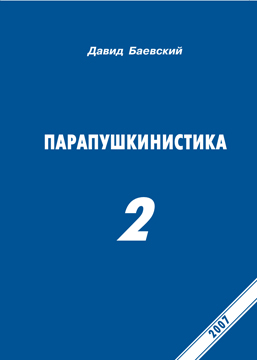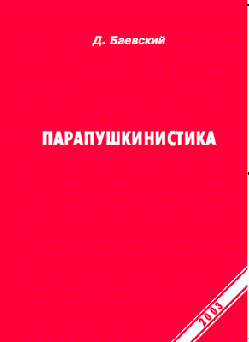
David Bayevsky
PARAPUSHKINISTIKA
Volume 2 (in Russian)
2007, 202 p., $29.99
ISBN-10 0-916201-25-2
ISBN-13 978-0-916201-25-8

The second volume of Parapushkinistika continues the task of historically documenting Russian reaction to Pushkin's Secret Journal, 1836-1837 , a book that has been published in 24 countries and has had four editions in Russia alone.
Parapushkinistika , first published in the United States in 1996, not only documents the reaction of Russian society to the Secret Journal , but also offers exhaustive scholarly insight into human nature, the Russian mind set, and the meaning of literature.
Volume two contains material from 2003-2006, as well as material from previous years that was discovered only after the publication of volume one in 2003.
Volume two also contains indexes of names and of print and online sources, covering both volumes.
David Bayevsky
PARAPUSHKINISTIKA
Fourth Expanded Edition, Volume 1
(in Russian)
Printed in Russia
2003, 400 p., $23
ISBN 0-916201-24-4

Alexander Pushkin's Secret Journal 1836-37,
published by Mikhail Armalinsky in the United States
in 1986, is the carefully studied subject of David Bayevsky's Parapushkinistika.
The book, using published reviews and other materials, examines the unorthodox
image of Pushkin and the extraordinary events of his life that traditional
"pushkinistika" is unable to accept or understand. Bayevsky's work contains
many Russian language reviews of Pushkin's Secret Journal
from 1987 to 2002. These reviews have appeared in most major periodicals
including: Ogonek, Voprosi Literaturi, Literaturnaya Gazeta, Pravda, Knizhnoe
obozrenie, Komsomolskaya Pravda, Nezavisimaya Gazeta, Oktiabr (Moscow), Novoye
Russkoye Slovo (New York), Vsemirnoye Slovo (St.
Petersburg), SM (Riga), Okna (Israel) and from many other periodicals.
Yeltsin reads the Secret Journal; academicians D. Likhachev and I. Kon; Director
of Russian Literature Institute (PushkinŇs House) N. Skatov talk about it;
prominent Russian literary critics V. Toporov, E. Peremishlev, B.. Filevsky,
V. Kuritsin, M. Zolotonosov, A. Levkin write about it. Fictional works are
created about it.
The Secret Journal is finally published in Russia in 2001 by the prominent
Moscow Publishing House "Ladomir".
This compilation exposes a panorama of the foolishness of the Russian literary
establishments use of Pushkin as a universal idol to be blindly worshipped
on a national level. Parapushkinistika is enjoyable reading as a satirical
story, and also serious reading as literary research and study.
The Fourth Edition has the
Index of Names and the Index of Periodicals.
Secret Journal is a unique book because as "Knizhnoe obozrenie"
announced, in Russia it is considered a form of valor not to publish the book.
Despite the fact that at the time it had not yet been published in Russia,
Knizhnoe obozrenie gave Secret Journal the ominous
award as the Worst Book of 1994.
In 1997 the same "Knizhnoe obozrenie" called Secret Journal "a
plague" sent upon Russia. Alexander Pushkin's Secret Journal 1836-37,
however has been published and can be found in the United
States (in both Russian and English), Italy,
Germany, France,
Greece, The
Netherlands, Mexico, Iceland,
Latvia, Korea,
Ukraine, Portugal,
Czech Republic, Taiwan,
China, Slovenia,
Lithuania, Albania, Turkey,
Yugoslavia,
Bulgaria, Hungary.
and Romania.
World
Literature Today, October-December 2003, p. 129,130
The preface to the first edition of Parapushkinistika defines as "a new
science" that developed from discussions about a book entitled Tainye
zapiski 1836-1837 godov A. S. Pushkina (Secret notes of 1836-1837 by A. S.
Pushkin). The present volume contains reactions to Tainye zapiski (which have
appeared in some twenty languages), the majority of which consider it a falsification,
authored by Mikhail Armalinsky, a Russian writer living in the United States,
well known for his fiction and poetry marked by explicit treatment of sex.
This reviewer shares this opinion - so, why this review?
My point is that this taking advantage of Pushkin's well-documented ribaldry
and lengthy Don Juan catalog accords with what has happened to the poet who,
having become a mythological figure, can be given any meaning desired if only
there is an iota of evidence to support it. The notion that Pushkin is a prophet
pointing Russia to a glorious future came out of "The Prophet" (1826),
a paraphrase of Isaiah. Pushkin has been made a Christian author on the strength
of identifying his views with those of Ivan Petrovich Belkin. He has been
recognized as a patriot and supporter of Russian imperialism by pointing to
"The Slanderers of Russia" (1831) and an "inner ╬migr╬"
by suggesting that the poet tried to leave Russia many times. Mayakovsky made
him his editorial assistant, and conservatives saw him supporting the monarchy
by his glorification of Peter the Great in "Poltava" and "Bronze
Horseman". In each and every case, the opposing view might be presented
with equal persuasiveness, often by accusing the opponent's view as slanderous
or even blasphemous.
Pushkin is like a deity of saint who can be called to support whatever the
situation requires. This even includes situation in everyday life. A housewife
may say, "Who will do the laundry? Pushkin?" She may as well have
said, "God?" Foreign scholars were identified automatically as "pushkinisty."
So why not have a science called "Parapushkinistika"?
Victor Terras
Brown University